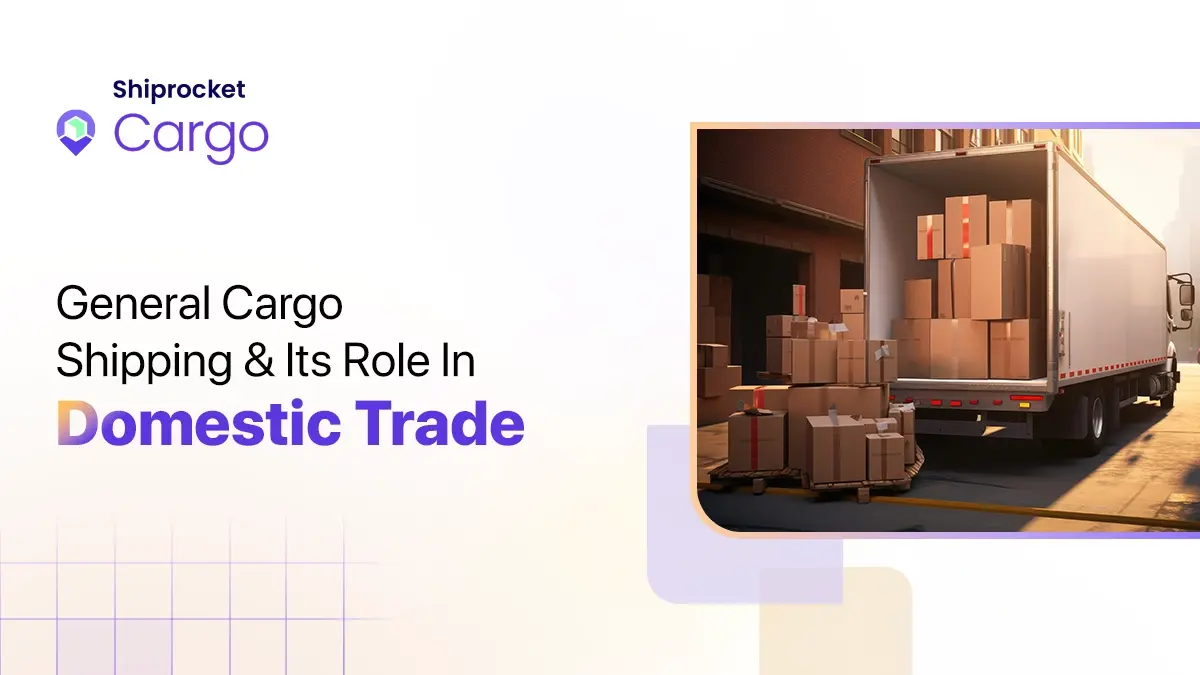Domestic Cargo Shipping in India: How it Works?
Domestic cargo shipping means transferring goods from one location to another within the boundary of a territory, using different types of transportation methods. Domestic cargo shipping supports a wide range of industries, like manufacturing, retail, agriculture, construction, etc. Strong domestic cargo transportation systems are needed to meet the needs of domestic customers as well as company owners. It also encourages economic expansion and ensures that goods are distributed on schedule.
In the fiscal year 2023, the combined domestic cargo volume handled by all scheduled airlines operating in India was close to 698 thousand metric tons. When compared to the prior year, this represented a rise. Dedicated freight and belly cargo accounted for the volume of cargo.
The capacity and efficiency of domestic cargo services to work effectively and dependably play an important role in the continuation of trade, industry, and commerce, from crowded urban centres to isolated rural communities. The complexities, importance, and methods of operation of domestic cargo shipping are examined below.
Domestic Cargo Shipping: An Overview
Domestic cargo shipping refers to the transportation of goods within the boundaries of a country. Within a country, cargo shipping is made possible by a variety of transportation modes like aeroplanes, trucks, trailers, ships, or trains. Domestic cargo shipping is important for society in many ways. It is necessary to promote business, trade, and industrial activity inside a country’s borders, thus
India’s domestic cargo shipping industry is constantly shifting and changing, depending on several variables like market trends, technical improvements, changes to regulations, and the expansion of infrastructure.
Types of Domestic Cargo Shipping
The different types of domestic cargo shipping offered in India are explained below:
- Air Cargo Services: This includes the transportation of goods by aeroplanes. It is one of the fastest modes of shipment for time-sensitive and valuable products. The cost of air transportation is typically higher than that of other transit modes. The capacity and availability of air cargo services in isolated locations may be restricted.
- Rail Cargo Services: Rail cargo services mean the movement of goods by trains. Indian Railways operates one of the biggest rail networks in the world, which links ports, industrial centres, and big towns. It works effectively for long-distance transport of big and bulky items or large volumes of material at lower transportation costs than road transport.
- Road Cargo Services: Road cargo services refer to the transportation of goods through trucks, vans, etc. Transporting goods to various locations has been made easier because of the vast network of roads, which includes state highways, rural roads, and national highways. Road cargo services are very easy to use and reach isolated locations with little connectivity.
Services Provided by Different Cargo Services
A wide variety of services are provided by different cargo services to satisfy the various transportation requirements of businesses. Some of these include:
- Cargo shipping services: cargo forwarding, or shipping services, is the process of organising and coordinating the movement of goods from one location to another. The cargo forwarders manage every aspect of a shipment, including the documentation, customs clearance, and logistical preparation. They offer the most affordable and efficient modes of transportation based on the kind of shipment, where it is going, and how much time is available for making the delivery.
- Transportation of goods: A variety of transportation routes, including air, sea, rail, and road, are offered by cargo shipping organisations.
- Road transport means the movement of goods via trucks, trailers, or other vehicles.
- Rail transportation uses passenger and goods trains to transport cargo across long distances, especially large and heavy things.
- Air transportation is used for the transport of products via aeroplane, which offers efficient and timely delivery of expensive and urgent goods.
- Water transportation is the process of moving goods by ships, vessels, or boats through canals and oceans. It is ideal for moving big and heavy cargo over long distances.
- Storage and Distribution: To efficiently handle, store, and transport products, cargo services usually also offer distribution and storage services. A storage service makes inventory management easier by providing a location to keep items that need to be shipped. On the other hand, distribution services cover the tasks of sorting, packaging, and delivering goods to their destination, including last-mile delivery to customers or distribution centres.
- Monitoring and Tracing: Cargo shippers typically provide tracking and monitoring services to their customers so they may check the whereabouts and status of their goods in real-time. These services allow customers to keep a watch on the products. Cargo services provide quick updates by utilising advanced monitoring technologies like barcoding, RFID, and GPS. With the help of this service, shippers may monitor the progress of their goods, anticipate any delays, and manage logistics effectively.
Peculiarities of Domestic Cargo Services
Various characteristics differentiate domestic cargo services from international ones. The following are a few of the main features of domestic cargo services:
- Domestic cargo shippers provide their services to geographic areas within the boundaries of a country. Therefore, they only focus on domestic transportation rules, laws, and infrastructure.
- Domestic cargo services are bound by the regulations and policies set by the country’s government. However, the regulations may differ as per different regions and states, which directly impacts the requirements of licences, safety rules, weight restrictions for cars, environmental laws, etc. in transportation.
- They transport goods from their distribution centers to their final destinations. Delivering the goods to the last mile becomes difficult sometimes because of various connectivity issues like traffic, weather, different customer requirements, narrow roads, etc.
- There have been many innovations to make delivery of the shipment to its destination possible, such as collaboration with local people and companies, hubs in urban areas, delivery through electric vehicles, drones, etc.
Top Domestic Cargo Services in India
- Indian Postal Service: It is a government department and was established in 1774. It offers domestic cargo shipping services, including express deliveries, logistics solutions, surface transportation, etc. The Indian postal service has approximately 1.5 lakh post offices for cargo shipping in India, which helps it become cost-effective and reach rural and remote areas.
- DTDC Express Limited: It was established in 1990 in Mumbai, India. It is one of India’s largest distribution companies and offers multiple cargo services to individuals as well as businesses. DTDC has more than 11,000 franchise hubs and covers more than 10,000 pin codes in India.
- Blue Dart Express Ltd: It was launched in 1994 in Chennai and is a subsidiary of DHL. They have a wide network covering more than 44,000 locations and offer multiple cargo services like warehousing, air freight, distribution, etc.
- First Flight Courier Ltd: It was established in 1968 in Mumbai. It has over 1200 offices in India, offering different domestic cargo shipping services like cargo forwarding, logistics solutions, etc.
- Delhivery Pvt. Ltd: It was established in 2011 in Gurugram, Haryana, India. It is one of India’s largest logistics and supply chain companies and offers a range of cargo services like supply chain solutions, warehousing, express delivery, etc.
Conclusion
To sum up, domestic cargo shipping is a vital component of India’s logistical network as it supports the country’s trade connectivity and growth in the economy. Efficient cargo shipping in India enables the seamless movement of goods across a wide range of industries and sectors. The significance of domestic shipping becomes even more important as India’s economy demands innovation, investment, and cooperation within the logistical network. India can further optimise its domestic cargo transportation capabilities by adopting technological developments, improving infrastructure, and encouraging collaborations. This would open fresh chances for growth, efficiency, and broader development of transportation networks throughout the country.
The stages of cargo shipping include packaging, labelling, loading, and transportation of goods to their final destination.
Some of the important documentation includes a bill, commercial invoice, certificate of origin, letter of instructions, inspection certificate, export licence, etc.


